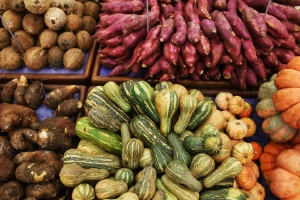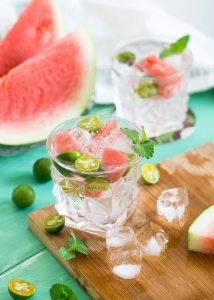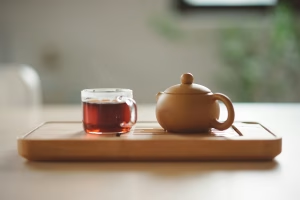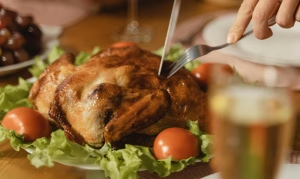Diet
What Fall Flavor Are You?

The brilliant rationale behind why the ancient Chinese associated certain seasons of the year with certain organs, then certain organs with flavors of foods (and herbs), had to do with the organic physiological responses to temperature and climate, how they align with each bodily system, and the biochemical reactions incited by each flavor in the body. For example:
Acrid goes up and out. Haven’t we all had the experience of sweating or decongesting after spicy food? Bitter goes down and out. Most have also had the experience of drinking coffee or green tea, then having to go to the bathroom. Sour goes down and in, as does sweet, whereas salty goes down and in, but brings enough water into our cells to then vaporize upwards, which is why its mechanism can RAISE blood pressure.
Unfortunately, in (Traditional) Chinese medical schools, due to modern misinterpretations of the medicine we are lucky if we’re taught half-truths of fact—too often we were told objective untruths—though regarding flavors and seasons we at least got the former.
We were taught that the acrid flavor corresponds with the lungs, which correspond with fall, though this is only one of fall’s flavors, and arguably the less significant one, nor was it ever really explained WHY the lungs correspond with autumn.
Fall is nature’s regression and recession, just as the days grow shorter and animals begin their hibernations, gases and blood in the human body sink deeper, as in towards our adrenal glands, where we can reproduce ample hormones and healthy blood to then rise again in spring. The chemical mechanism induced by acrid foods or herbs DOES NOT encourage this movement. So, while less educated practitioners uniformly advise everyone to eat more onions, garlic, and ginger during fall, recall there should never be any one size fits recommendations in (holistic) medicine or nutrition.
Because the chemistry of acridity moves things upward and out in the body it is surely useful for dislodging the phlegm and mucus often accumulated during allergy, flu, and covid season. It can also be useful for patients who find that during autumn and/or year-round, they have a remarkable difficulty with all kinds of rising—whether out of bed in the morning, off the couch to exercise, intellectually, or in sexual engagement.
For the other half of the population, the more calming, descending mechanism of sour is more logical. Especially since along with bitter, another “flavor of descent,” sour is one the more unrepresented ones in most American diets, maybe partially explaining why modern Americans have so much difficulty with grounding, sleeping, and slowing down.
To understand which flavor should dominate your diet and herbal formulas this season, you can try feeling the (second/middle finger) “guan” pulse position on your left wrist. If the artery feels small or weak your body needs acridity! But if it feels big, inflamed, angry, you need LEMONS 🙂 When life gives you lemons, first feel your pulse. Or get your acupuncturist to do it.
As for nature and safer one size fits all advice: ‘tis the season of root vegetables, so cook plenty of carrots, radishes, beets, yams, and brussels sprouts. In fact, a perfect way to roast the latter is with garlic, onions, and lemon (+salt and olive oil), thereby getting the best of both worlds. Really in my house I should separate them on the pan and take the lemon part for myself and allot all acridity for my wife! But who has the time? I’ll just drink my sour herbs.
Small Choices vs. Extreme Diets
 It is relatively easy for people to follow dogmatic diets, routines, and lifestyles, be it veganism, “paleo-ism,” gluten free, resolutions like never skipping a day of running or their yoga practice no matter the weather. Any of these can be beneficial in certain ways, though rarely are any a one-size fits all magic bullet for long term, full-body health.
It is relatively easy for people to follow dogmatic diets, routines, and lifestyles, be it veganism, “paleo-ism,” gluten free, resolutions like never skipping a day of running or their yoga practice no matter the weather. Any of these can be beneficial in certain ways, though rarely are any a one-size fits all magic bullet for long term, full-body health.
As is the case with environmental consciousness, most of us must constantly make small decisions each day, determine what is best for us in the present moment based on what we did or consumed the day before. For example:
If you spend the day sitting at work, obviously it makes sense to stand on the train, take the stairs, and/or walk as much as possible. Physicians wrote in our classical medical texts that “excessive sitting harms the spleen,” which translates as a sedentary lifestyle weakens our digestion. No news there (except how brilliant the ancient Chinese were sans technology)!
Conversely, if you’re incredibly active for a day or two or twenty in a row, as go the lives of parents of young children, you might get more benefit the next day from prioritizing a mid-day siesta instead of a workout.
If your friend cooked a lovely, carnivorous dinner for you over the weekend of grass-fed beef and sausage, as did mine, it makes sense to be vegan or pescatarian for the following 1-2 days after. By all means reap the benefits of the red meat, but give your organs and arteries a reprieve from beef’s heaviness. Hot green tea is also advisable the following day.
On the other hand, if your diet is omnivorous and you haven’t had any red meat during the week you should probably do so, especially if you are a woman on her menses, ideally alongside steamed or sauteed vegetables.
If you eat a bunch of raw, uncooked foods have it with hot tea. If you have a bunch of cooked, spicy foods, STILL have it with hot tea, because hot tea just generally aids digestion, and is therefore perfect, thereby nullifying my one size cannot fit all maxim. Green tea is generally preferable if you tend towards constipation. Black (Pu-Erh) tea highly preferable if you tend towards diarrhea. If caffeine causes excessive urination, it probably means your “yang qi,” or capacity for fluid transformation is failing to descend into the bladder and kidneys. This can often be rectified with some Paleo meals, Chinese herbs, and/or just a good night’s sleep.
Get to bed by 11pm, when the body and brain shift entirely into restoration and repair mode.
Don’t eat (much) after 7pm, and especially not after 9pm, when we are more insulin resistant. If you must drink alcohol do so less nights than not, so as to let your organs recuperate. Sweat from exercise, but not too much, as sweat contains within it vital neurotransmitters and substances that are necessary for metabolism andcirculation.
Socialize. Community is to modern society what food was to the ancient Chinese at the inception of our medicine. For the most part we are figuratively starving, for connection, so make it a priority to meet up with friends, even if you feel awkward reaching out 🙂
How to Combat the Humidity

Nobody loves humidity, but many people are more perturbed by it than others, determinable of course by what the humidity is encountering at their surface—that is, what it is physically triggering for them.
Humidity is “damp heat,” so if you already suffer from an excess of systemic damp heat type inflammation at the surface of the body, pouring more of the same on top of that will surely feel awful. What can we do about it?
Nutritionally the ideal foods to combat the damp heat of summer are unfortunately not very fun or exciting, but let’s try to all be grown-ups.
Bitter foods like dandelion greens are great for clearing inflammatory heat, while bland foods, such as unseasoned (or very mildly seasoned) potatoes, barley or barley tea, and plain, steamed vegetables are ideal for leaching damp fluid retention. If this sounds too inconceivable for you, I’d recommend entertaining such discipline just once a day.
Additionally, the bitterness of a good quality, hot green tea and its diuretic effect an aid in draining dampness. Then again, if green tea is unsettling for your stomach you are probably too “cold” for it internally, which unfortunately is not mutually exclusive to having damp heat externally. The former refers to pancreatic and gastrointestinal hypofunction, whereas the latter is part of the inflammation as its logical outcome. See also, eczema due to food allergy.
Instead of over-complicating, over-analyzing, and arguably over-prescribing, all of which I have been more than prone to, for this time of year I recommend at the least “dui yao” (dway-yow) teas, or pairings of 2 simple herbs to drink daily to combat the humidity we’re experiencing, mitigate our unique genetic responses to it, and ensure as productive digestion as possible for the upcoming transition to Fall, when we need our immune system firing on all cylinders!
Examples: Pearl barley and raw ginger if you have a weak stomach, Pearl barley and red dates if you get heart palpitations or dizziness or are on your cycle, Pearl barley and tangerine peel for lack of appetite, or pearl barley and adzuki bean for hemorrhoids, sweaty feet and groin. Are you seeing a trend? This is barley season!
What are everyone’s favorite cinematic depictions of gut-wrenching NYC summer humidity? I vote Do the Right Thing and Weekend at Bernie’s
What Should We Be Drinking?
 How much water should we be drinking? Is cold water okay? Is coffee healthy or not, already? What about decaf? What about green tea? Green juices? Prune juices? Sparkling water??? Please tell me sparkling water is OK! It’s all I’ve got…
How much water should we be drinking? Is cold water okay? Is coffee healthy or not, already? What about decaf? What about green tea? Green juices? Prune juices? Sparkling water??? Please tell me sparkling water is OK! It’s all I’ve got…
Across the generations (and mediums) there have been many hydration gurus, and I suppose in this blog I’m throwing my hat into the ring, albeit really as just a hopefully qualified echo of Chinese medicine’s biological perspective.
Sparkling water is OK, but can irritate the bladder—should be kept to 1/day.
Room temp water is best, ideally half of our weight in ounces each day. Cold drinks can impair digestion, but again, once a day outside the context of a meal is no big deal, imo.
Juice is worse than people think—green juice not quite as good as people think. Green juices, without the sugars of fruit inside them, are fine, but should not replace real meals where salivary amylase is generated, we actually eat, and chew whole (green) vegetables.
One coffee/day should be fine for most people, but obviously has an excitatory and diuretic effect, so if one suffers with a lot of heat or dryness symptoms, should be minimized. These can include everything from insomnia and irritability to bloating or lack of appetite (dryness of digestive enzymes).
Green tea is preferable in people with “heat patterns,” and/or after a night of eating red meat, which can generate heat in the intestines. Again, because of its bitterness, people who tend to nausea, diarrhea, or lack of appetite should steer clear of green tea, and reach instead for…
PU-ERH TEA! Probably the healthiest thing one can drink besides clean, room temperature water, pu-erh is a black tea known for its naturally occurring pre and probiotics that enhance digestive and gut barrier function, the latter of which gets compromised by stress, medications, or alcohol. And I don’t know anyone who doesn’t check off at least one of these. Best taken hot.
I try to limit myself to 2 caffeinated beverages/day (I think no one should have more than 3), which are routinely a cup of Purity black coffee, followed by a cup of pu-erh, from either ARBOR or YUNNAN SOURCING, both of which offer organic and fair trade, high quality products. Highly recommend!
Tryptophan Foods & its Benefits

The ancient Chinese stressed the importance of eating foods that are “rich in qi and blood,” which upon scientific reflection, was in many cases referring to foods that are dense in the amino acid, tryptophan. Why?
The amino acid, tryptophan, is the precursor to the neurotransmitter, serotonin, which in turn regulates sleep and emotions, also digestive function, blood clotting, bone, and cardiovascular health. Circling back to Chinese medical terms, when your acupuncturist says that your gut is reliant upon strong and healthy “qi” to produce strong and healthy blood, this is what they mean. We need amino acids to produce not only literal blood, but also the neurotransmitters whose functions are synonymous with that of “the blood,” from a Chinese medical perspective.
Most people think of tryptophan around Thanksgiving and its effects of making us tired after the enormous holiday meal, but that fatigue is actually more likely due to the profound overconsumption of carbs and calories.
Other sources of tryptophan besides turkey are as follows, complete with warnings of their potential side effects and how to mitigate them:
- Chicken
- Is mass produced, so be sure to always consume in good, organic quality. Also can overstimulate the liver vessel, so ideal to consume with sour foods, such as lemon or sauerkraut to offset this effect. Unfortunately, the worst way to consume chicken is with hot sauce or spicy foods, which potentiates this effect.
- Beef
- Can generate excessive heat in the intestines, so should be consumed alongside bitter greens. Again, sad news: the worst way to consume is alongside alcohol, which can potentiate the heat effect. Eat plenty of bitters to counteract!
- Fish
- Beware of high mercury fish, as my wife always reminds me! Other than that, as the many centenarians of Okinawa and the Mediterranean know, there are little side effects to wild fish
- Eggs
- They’re just too expensive these days, and the inorganic variety are a problem. Other than that, eggs are nearly as perfect as fish 🙂
- Dairy
- Dairy has health benefits, but it is very cold and damp in its physiological behavior in the body. If you tend to low appetite, brain fog, diarrhea, bloating, or skin conditions you should avoid as much as possible.
- Soy
- Soy is also cold and damp and should be cooked alongside plenty of spices, onions, garlic, ginger, and even hot peppers, to offset its effect.
Besides tryptophan, another Thanksgiving cliche that benefits qi and blood is gratitude 🙂

